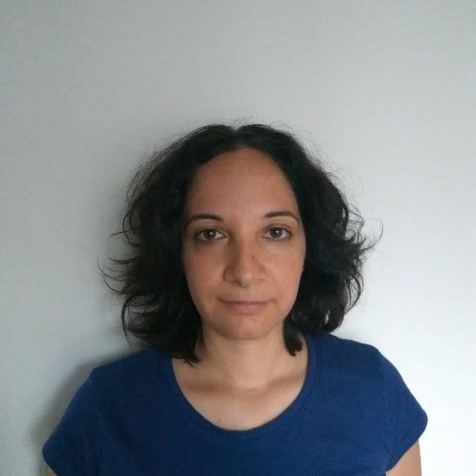UBITECH – the Interview
Behind every project there is a team of people who work together for a common purpose. Knowing a project does not only mean understanding the results achieved or the activities carried out, but also knowing who is behind these activities, what motivates them and what were the life paths, choices and personal goals that led them to be part of a research team today. For this reason we want to introduce you today one of the frESCO partners, Dimitra Georgagaki from UBITECH, through an interview dedicated to her.

UBITECH
Would you briefly describe yourself and your career?
I am the Head of ESAD (Energy Systems Analysis & Digitization) Unit in UBITECH which is an R&D group about digitizing energy transformation, energy data management and big data analytics. I received my diploma in Physics from the Aristotle University of Thessaloniki in 2005. I specialised in Computational Material Science through my MSc and PhD degrees where I discovered my passion in software engineering and data analytics.
Since 2013 I have worked both as software as well as data engineer in Athens and in London, with tasks ranging from software programming, testing, requirements analysis, end-to-end data pipelines design and implementation, big data analytics, mentoring and delivering presentations to technical audience.
What does UBITECH organization mainly deal with outside the frESCO project?
UBITECH is a leading, highly innovative software house, systems integrator and technology provider, established to provide leading edge intelligent technical solutions and consulting services to businesses, organizations and government in order to allow the efficient and effective secure access and communication with various heterogeneous information resources and services, anytime and anywhere.
UBITECH has delivered several mission-critical IT projects in several domains, such as financial, retail, banking, security, etc. In parallel, the company is active in several cutting-edge research projects mainly in the areas of cloud orchestration, digital security, risk management, as well as knowledge engineering and data management. Through the synergy of commercial and research projects, the company has acquired significant and invaluable experience and technological know-how.
Which is your role in frESCO?
Within frESCO, UBITECH will lead the activities towards the delivery of a multi-service package toolkit for service providers. Specifically, UBITECH will lead the implementation of an Energy Management Analytics and Self-Consumption Optimization Tool for ESCOs, which will focus on the automated increase in self-consumption and efficiency of buildings, and the Advanced Flexibility Analytics and Optimal VPP configuration tool for Consumer-Centric Demand Response Optimization, which will support aggregators to acquire demand response flexibility from consumers according to the needs of the system operator. Finally, UBITECH will drive the frESCO platform architectural design and detailed specs definition.
Why do you think that the multi-service package toolkit can be a winning solution for ESCOs and aggregators?
The multi-service package toolkit will actually be able to provide advanced services to satisfy plenty business needs of both ESCOs and Aggregators. The well-studied exploitation of large quantities of multi-sourced data will be able to hand precise short-term forecasting of a series of sizes useful for both stakeholders to schedule their next moves. The advanced analytics can enable the acquisition of crucial conclusions and, thus, the determination of long-term planning. The continuous monitoring and exploitation of various quantities like generation, consumption, weather forecasting, wholesale electricity pricing etc., can provide better results regarding all the main performance indicators and, therefore, advanced customer services and increased profitability.
Can you briefly describe what is the idea behind the main tools you will develop for the frESCO project (Self Consumption Optimization tool and Advanced Flexibility Analysis and Optimal VPP Configuration Tool)? What will these tools allow to perform?
The tool will dig into the building energy consumptions collecting data from plenty generation and consumption assets, in order both to provide accurate forecasting, but also to point out patterns, individual temporal habits that can prove useful for many mechanisms such as the portfolio clustering, the triggering of aimed motivation for peak shaving through load shifting.
The tool will provide a dashboard devoted to the needs of each type of stakeholder (ESCOs, aggregators) presenting visualised analytics including historic data, forecasting, recommendations, but also the ability to send dispatch signals to the consumers to activate their demand response.
What are the main challenges you face in this project and how do you overcome these challenges?
There are many challenges both from the side of implementation and the final exploitation of the results. For example, since the project focuses on the acquisition, aggregation and utilization of data from multiple sources, it is crucial to actually have high data availability, both historical and present. This means that we, as a consortium, will have to motivate consumers by communicating that we can meet up their needs, ensure our respect to their personal data, etc.
Moreover, there are other regulatory and economic barriers, such as the fact that flexibility markets do not exist in all countries of EU, not even in all the ones that the frESCO services will be demonstrated. This means that the project results will not be instantly useful and available for everyone, but also that even some project requirements will be difficult to be defined. On the other hand, the fact that the European economy tends to become even more open to such business solutions and operations, means that the exploitation of the project results will certainly become replicable to nearly everyone in EU in the near future.
What do you enjoy the most about working in an international Project Consortium such as frESCO?
It is very satisfying that the consortium involves a variety of partners including technology ICT providers, business demonstrators and research institutes, which means that our discussions can have a holistic point of view including the update of both business and technical requirements. As a result, each partner also gains and not only gives, the project results include not only the exploitation of the project results, but also the experience from experts that regard the topic from a quite different aspect.





